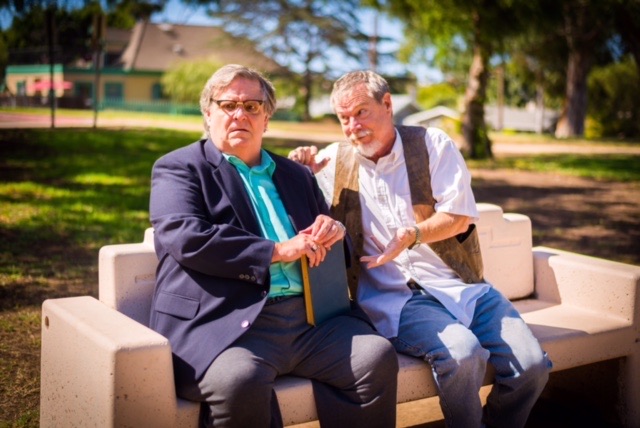Typecasting Is King in SDAT’S Withering ‘The Zoo Story’
Gayla Peevey wants a hippopotamus for Christmas, and she’s been asking for one since 1953. If you’re an exceedingly old man like me, you may recall the classic novelty song title that reflects her annual request — if not, you have only to see San Diego Actors Theatre’s very good The Zoo Story to ignite the memory.
Just don’t broach the topic with a weird guy named Jerry, who walks through Central Park like he owns the jernt. His exquisite, ancient gaze will effortlessly hold you fast to the bench of your choice, and he’d easily win any debate on the merits behind Peevey’s entreaty.
If you don’t like it, things could get pretty damn ugly.
Stay with me here.

Peter (Fred Harlow, left) doesn’t stand a chance against Jerry in ‘The Zoo Story.’ Photo by Dmitri Diakov.
That part’s up to you to conclude. Director Patricia Elmore Costa gives you plenty of latitude to do as much, coaxing two perfectly fine performances from two perfectly collaborative souls, one of whom I fleetingly thought would have been miscast.
Peter makes like $200,000 a year as a New York publishing executive, and he’s got the unremarkable lifestyle to go with it (a wife, two daughters, two parakeets, two cats). His middle-age affability is sorely tested on his chance meeting with dog-eared Jerry in Central Park — a peaceful Sunday afternoon is about to turn deadly, preceded by Jerry’s assault on Peter’s kindly sensibilities.
The former regales his captive with his life story (which includes detailed accounts about a supernatural dog, a black neighbor guy who wears a kimono to the bathroom and the reasons he, Jerry, recently visited the zoo).
Push comes to shove as Jerry challenges his adversary to fight for his turf in the park (namely the bench) — in fact, he takes the skirmish to Peter as one thing lethally leads to another, marking Peter’s blood-curdling cry for surcease at show’s end.
As snarkily articulate as he is, Jerry is also a bit of a savant, with an enormous eye for the personal traits that lead to the mainstream definition of success, which he abhors. His stories at once befuddle and fascinate Peter, the way a drive-by shooting might simultaneously rattle and enthrall a bystander.
Fred Harlow’s Peter is benevolent to a fault, his already shaky defenses crumbling in the face of a vastly superior wit.
Elmore Costa sees those moments word for word, pitting predator and prey in a battle whose outcome was absolutely necessary and foretold amid modern life’s harshness and despond.
In that context, this show’s defining moment is absolutely unmistakable — it occurs with Jerry’s demand that Peter vacate the bench. Byron LaDue’s character is chillingly understated in his order, masterfully hurling a wretched lifetime at Peter in the blink of an eye. Fred Harlow’s Peter is benevolent to a fault, his already shaky defenses crumbling in the face of a vastly superior wit.
I could have sworn Harlow would have been cast as Jerry when I heard this piece was scheduled — but no matter. He acquits himself very handsomely here, his devastation at Jerry’s demise a ghastly shade of red.
The simple set is about as site-specific as site-specific gets, with a park bench and a sprawling osier tree its only components.
And Peevey’s hippo? Bless him, he’s one of the characters in the preshow soundbed, which includes references to lots of animal-intensive stuff; Jerry would have had a field day talking the audience’s ear off about that cast of characters, and that makes it particularly well-chosen.

Edward Albee, who died at 88 in 2016, unleashed a torrent of scholarly debate with his play. Public domain image.
He’d go on to write The Zoo Story, his first full-fledged play, in three weeks; three drama Pulitzer prizes and a boatload of lifetime achievement nods would follow.
Meanwhile, he’d always said that The Zoo Story was a pretty good play amid the tragic Jerry’s insights. With this production, we confirm it.
This review is based on the performance of Sunday, Oct. 29. The Zoo Story runs through Nov. 12 in the southwest area of Pioneer Park, 1521 Washington Place at Randolph Street in Mission Hills. $20. 858-268-4494, sdactorstheatre.net/online.

Martin Jones Westlin, principal at editorial consultancy Words Are Not Enough and La Jolla Village News editor emeritus, has been a theater critic and editor/writer for 25 of his 47 years…
More…
